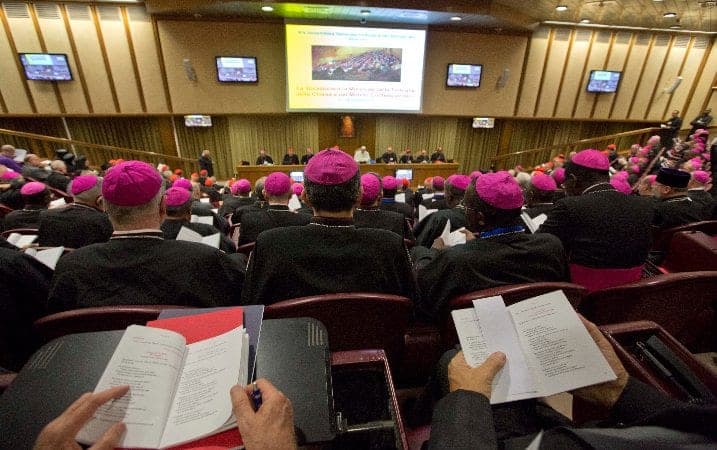ROME — At the first session of the keenly anticipated Synod of Bishops on the family, Pope Francis called on the roughly 300 prelates gathered in Rome not to wheel and deal on issues like a legislature, but to be guided by divine inspiration in their deliberations and discussions.
“The synod is not a parliament, where in order to reach a consensus we start to negotiate, making deals and compromises,” the pope said. “The lone method in the synod is to listen to the voice of the Holy Spirit.”
God’s plan, Francis said, “is always greater than our logic and our math.”
In that light, Francis called on the bishops to display three qualities during the synod, which opened with a Mass Sunday and runs until Oct. 25:
- Apostolic courage: Courage that is needed because the Church’s attitudes can, “despite good intentions, distance people from God” and make “Christian life a museum of memories.”
- Evangelizing humility: The humility bishops need to empty themselves of “their own beliefs and prejudices to listen to their brother bishops and fill themselves with God …. A humility that doesn’t point the figure against another to judge them, but to extend a hand to help them up without ever feeling superior to them.”
- Trusting prayer: Prayer to hear the “soft voice of God that speaks in silence.”
At least as far as courage is concerned, one bishop in the room certainly seemed to get the memo.
Hungarian Cardinal Péter Erdő, hand-picked by Pope Francis to guide the meeting in his role of “General Relator,” opened things up by boldly drawing some lines in the sand, defending traditional Catholic teaching on hot-button issues including Communion for the divorced and the remarried, homosexuality, and contraception.
On the debate over allowing Catholics who have divorced and remarried without an annulment to receive Communion, Erdő said, “The indissolubility of marriage is not primarily intended as ‘yoke’ imposed on people, but as a ‘gift’ given to a couple united in a marriage.”
Anticipating the objection that the Church ought to be more merciful, Erdő said that when Jesus showed mercy to sinners, he also clearly told them to “go and sin no more.”
On homosexuality, Erdő was equally unyielding.
“There is no basis for comparing or making analogies, even remotely, between homosexual unions and God’s plan for matrimony and the family,” he said, quoting a 2003 document from the Congregation for the Doctrine of the Faith penned by Francis’ predecessor, Pope Benedict XVI, when he was still Cardinal Joseph Ratzinger.
Regarding a pastoral approach to the members of the LGBT community, Erdő said that every person must be respected in their dignity, regardless of their sexual orientation, and called for programs designed “to families that have members with homosexual tendencies and for these people, too.”
He added that it’s unacceptable to try to “pressure” pastors of the Church into a particular view of same-sex relationships, or for international organizations to tie development assistance for poor nations to their recognition of same-sex marriage.
Quoting Francis, Erdő said that “The difference between men and women isn’t opposition, or subordination, but for communion and generation, always image and likeness of God.”
Regarding contraception, Erdő complained that “consumer society has separated sexuality and procreation,” and said this was one of the causes of falling birth rates around the world.
“Sometimes it descends because of poverty, but in other cases by the lack of will to assume responsibility,” he said.
Erdő also spoke against “the dangers presented by the technical possibilities that separate procreation from conjugal love,” issuing a ringing defense of the late Pope Paul VI’s controversial 1968 encyclical Humanae Vitae, which reaffirmed the Church’s traditional opposition to birth control.
The prelate also called for Catholics to defend life from the moment of procreation until its natural death, calling for families to be more attentive to youth and the elderly, and defended the right — and duty — of parents to educate their children.
In his remarks, Francis called for the bishops to remember that the synod isn’t a parliament, that decisions aren’t based on negotiation, but in listening to the Holy Spirit.
Concluding his remarks, Erdő said that by listening to the word of God, the Church’s response to the challenges families face should take their needs into consideration while showing them “God’s freeing truth and … mercy.”
With the opening formalities out of the way, the synod now gets down to business. Meetings will alternate between small working groups organized by language, and general congregations where all the bishops gather to listen to any prelate who wants to give a brief 3-minute speech.
The first week’s agenda is about challenges facing the family, the second week will focus on the vocation of the family, and the third is devoted to the mission of the family today. The Vatican has announced that each week, it will release full minutes of the working group meetings.
Last October, it was the reports from the working groups that revealed the synod’s inner tensions, especially on the divorced and remarried and also the kind of approach and language the Church ought to use in its ministry to gays and lesbians.













